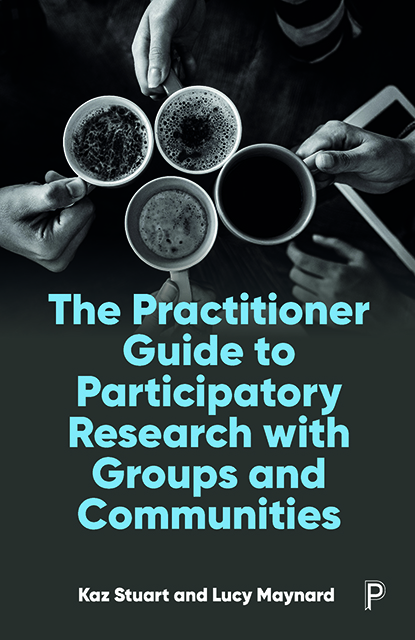Book contents
- Frontmatter
- Contents
- List of Figures and Tables
- Glossary
- About the Authors
- Acknowledgements
- Foreword
- Foreword
- Introduction
- 1 Just What is Participatory Research?
- 2 How do We Begin to Plan Our Participatory Research Project?
- 3 What Do We Want to Explore and Why?
- 4 What Ideas are the Foundations of Our Research?
- 5 How Will We go About Exploring Our Questions?
- 6 Who Can Get Involved to Explore Our Questions?
- 7 How Shall We Collect Our Data?
- 8 What Do We Do With Our Data?
- 9 How Do We Get Our Messages Out There?
- 10 How Do We Keep Everyone Safe?
- 11 Doing and Reviewing Participatory Research
- Conclusion
- References
- Index
3 - What Do We Want to Explore and Why?
Published online by Cambridge University Press: 21 June 2023
- Frontmatter
- Contents
- List of Figures and Tables
- Glossary
- About the Authors
- Acknowledgements
- Foreword
- Foreword
- Introduction
- 1 Just What is Participatory Research?
- 2 How do We Begin to Plan Our Participatory Research Project?
- 3 What Do We Want to Explore and Why?
- 4 What Ideas are the Foundations of Our Research?
- 5 How Will We go About Exploring Our Questions?
- 6 Who Can Get Involved to Explore Our Questions?
- 7 How Shall We Collect Our Data?
- 8 What Do We Do With Our Data?
- 9 How Do We Get Our Messages Out There?
- 10 How Do We Keep Everyone Safe?
- 11 Doing and Reviewing Participatory Research
- Conclusion
- References
- Index
Summary
Chapter overview
This chapter will support you in developing a research aim and research questions for your participatory research project. We will start with an explanation of both and then offer you some tips to develop them for the project with a group, organisation or community. This chapter also introduces the idea of ‘locating’ your study in a wider field of literature so that you know what other people think about the area you are exploring.
Research aim
At the start of a research project it is useful to have a shared goal you are all working towards. This is called a research aim. Your aim will identify what you want to research (the topic or content) and what you want to achieve by doing the research (the benefits). It is really important that time is dedicated to this process, so everyone involved in the research project feels engaged, involved and represented. What and why you do the research is perhaps the most fundamental decision of all.
Equipped with a research aim (and question, as discussed later) you can be clear about the focus of the research and you will be able to explain your research easily to other people. The research question will also help you to have boundaries so you are clear what is included and excluded from your study – this will help you to stay on track.
There are several ways to work out what topic you will research together and how you do it will vary by the context and the people you are working with. Broadly, you will need to explore all the different topics that the co-researchers might be interested in. Interests might come from things the group have experienced themselves, things they have noticed around them, things they have read or heard about in the media or things that are important to the communities they live or work in. All of these sources for inspiration are equally valuable.
Developing a list of topics is most commonly achieved by talking together in a group and drawing a concept map of all the possible topics.
- Type
- Chapter
- Information
- Publisher: Bristol University PressPrint publication year: 2022



